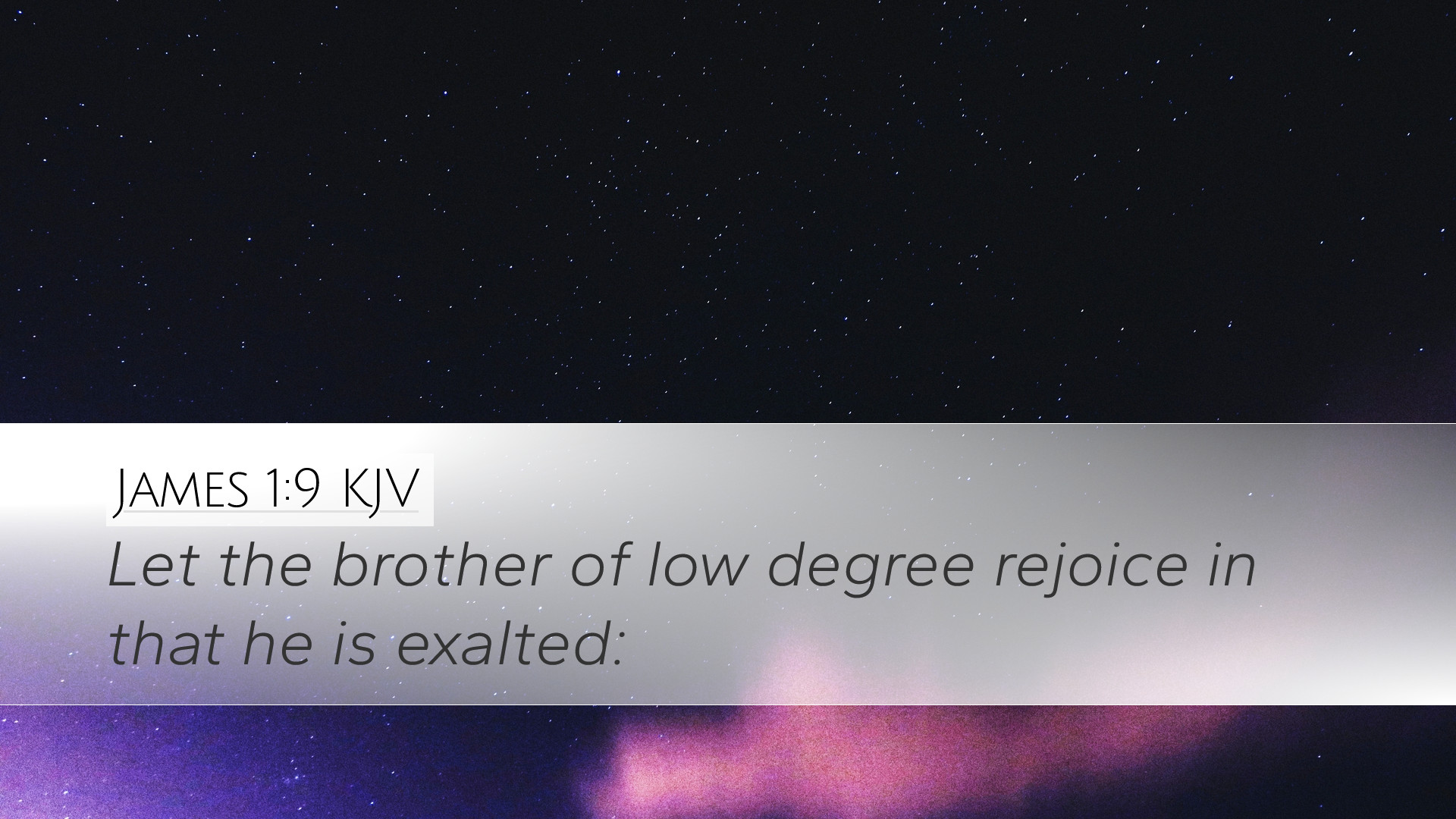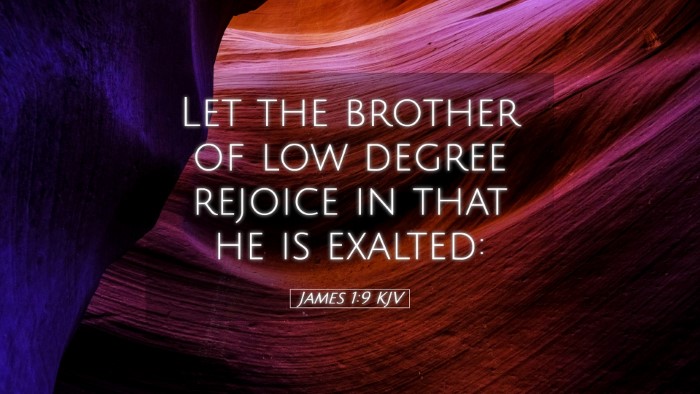Old Testament
Genesis Exodus Leviticus Numbers Deuteronomy Joshua Judges Ruth 1 Samuel 2 Samuel 1 Kings 2 Kings 1 Chronicles 2 Chronicles Ezra Nehemiah Esther Job Psalms Proverbs Ecclesiastes Song of Solomon Isaiah Jeremiah Lamentations Ezekiel Daniel Hosea Joel Amos Obadiah Jonah Micah Nahum Habakkuk Zephaniah Haggai Zechariah MalachiJames 1:9
James 1:9 KJV
Let the brother of low degree rejoice in that he is exalted:
James 1:9 Bible Commentary
Commentary on James 1:9
James 1:9 states, "Let the lowly brother glory in his exaltation." This verse provides a profound insight into the nature of humility and exaltation in the kingdom of God.
Contextual Overview
In the opening chapter of James, the apostle addresses various trials and temptations that believers encounter, advocating for perseverance. He presents the contrasting states of richness and poverty, a theme that resonates with his audience—primarily Jewish Christians.
Exegesis of the Verse
The phrase "lowly brother" refers to those of humble circumstances, possibly the economically disadvantaged. This humble state is often devalued by the world, yet James calls for a rejoicing in one's position, hinting at a divine perspective that upends worldly values.
Insights from Matthew Henry
Matthew Henry interprets this as a significant principle of the Christian faith, where the humble are raised in character and spirit. He emphasizes that true glory comes not from material wealth but from the grace and favor of God. "The Christian’s low estate here exposes him to many trials, but it also raises his expectations for future glory." This aligns with the beatitudes where Jesus speaks to the blessedness of the poor in spirit. Henry encourages believers to see their lowly state as a platform for spiritual exaltation.
Insights from Albert Barnes
Albert Barnes elaborates that the "lowly brother" signifies both a humble spirit and those in temporary financial distress. He states, "The rich should not be proud of their wealth, nor should the poor despair of their condition." Instead, both are reminded that their status in Christ supersedes their earthly conditions. The exaltation mentioned is a call to recognize the high privilege of being in Christ, suggesting that those who endure trials for their faith will ultimately experience divine elevation, not just in the next life but also in terms of character development and spiritual maturity.
Insights from Adam Clarke
Clarke highlights the paradoxical nature of glory in humility, commenting that the "lowly brother" should find joy in God's approval and perspective, which transcends temporal circumstances. He writes, "This joy springs from faith that looks beyond the present suffering to the promised reward." Clarke also notes that James encourages humility as a path leading to spiritual richness and that in God's economy, the first shall be last, and the last shall be first, reflecting Jesus' teaching on humility and servanthood.
Theological Implications
This verse challenges contemporary notions of success and social status, calling believers to a radical re-evaluation of their values. The humble are exalted, not by worldly standards, but by God's grace. This principle informs our understanding of God's love and equity: all believers share equally in the inheritance of the kingdom regardless of their earthly status.
Practical Applications
- For Pastors: Encourage congregants to embrace their lowly status as a source of spiritual strength and identity in Christ.
- For Students: Reflect on the implications of spiritual humility in academic settings and social interactions.
- For Theologians: Explore the doctrine of grace and the significance of humility in the New Testament.
- For Bible Scholars: Engage in a comparative analysis of this theme across various biblical texts, considering the socio-economic context of the early church.
Conclusion
James 1:9 serves as a powerful reminder that God's values often contradict worldly perspectives. The lowly are called to recognize their true worth and glory found in Christ. As believers navigate their earthly existence, they must do so with the promise that their divine exaltation is assured, leading to a deeper appreciation of God’s grace throughout life’s trials.


